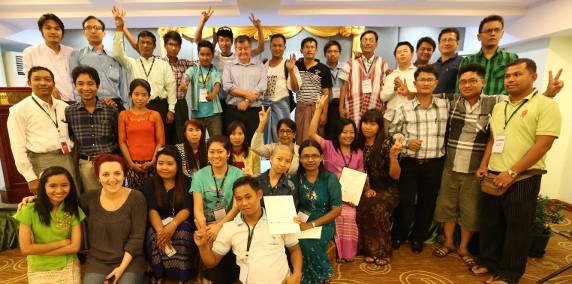Programs

APJC helps Myanmar media prepare for reporting general elections
To help Myanmar’s news media face the challenge of reporting the country’s general elections in November, APJC has mounted two election reporting workshops in Yangon.
The training, run in conjunction with the International Press Institute’s 2015 world congress and general assembly, was conducted by senior Melbourne journalists and academics Phillip Chubb, of Monash University, and Andrew Dodd, of Swinburne University, both experienced in reporting politics and elections.
Dodd said the national elections would be a litmus test for the freedom of Myanmar’s press. “As one senior editor told us, only the Government is ready,” he said.
“The media is desperately trying to get ready. Media houses are planning their coverage but many have realised that they lack the skills and experience required to cover the election in a comprehensive way.”
The first workshop, run as part of IPI’s program, was for 20 journalists from across Myanmar, with travel assistance provided by Action Aid. The second was for 15 reporters working with Mizzima Media, a news media organisation that has returned to report inside Myanmar after years of exile.
Dodd said some of the participants, who came from radio, television and print media, had experience in covering the last election in 2010.
“That election took the country a step closer to democracy,” he said. “The participants told us they were keen cover the 2015 election because there is so much more at stake, including the real prospect of a change of government.”
Workshop discussions covered techniques for reporting electorates, candidates and policies, and issues to do with access and transparency. They also provided an opportunity to discuss personal safety and dealing with military and conflict situations.
Some had fresh memories of riots in a nearby town, where several journalists were beaten by the police and two were imprisoned, Dodd said.
“Many individual media organisations are on a crash course to get their reporters ready. Mizzima Media is training its reporters in almost every aspect of election coverage so that it can offer meaningful analysis and timely news,” he said.
The workshop for Mizzima reporters included discussion on how to report minority viewpoints and how to prioritise news coverage so that the most relevant voices get heard – a difficult job in a country that has more than 70 registered parties.
Dodd said Myanmar reporters expressed relief that they are no longer subject to the restrictive censorship bodies that until just three years ago closely regulated all news coverage. “They are excited about the prospect of deregulation, hoping it will open up radio and television markets to greater competition and allow private companies to compete with state-owned stations.
“But they are also wary of the slow rate of reform that has kept draconian national security rules in place, restricting their ability to report freely. They are conscious that some of their colleagues are in prison because they have reported sensitive matters and that criminal defamation laws are used by the powerful to curb critical reporting.”
APJC director John Wallace said the workshops were a great opportunity to help colleagues in Myanmar prepare for the elections. “We are very pleased to be able to get the services of two journalists with both print and broadcast experience in covering elections and who have published extensively on politics and election reporting.”
The workshops were supported with guidance from formerly-exiled journalist Soe Myint, editor-in-chief of Mizzima Media, and with contributions from IPI co-chairman Bulbul Ahsan Monjurul, editor-in-chief of Boishakhi TV.